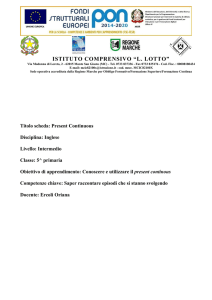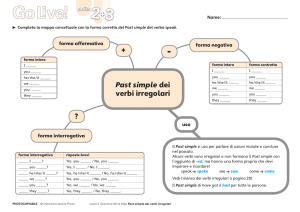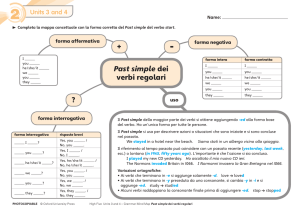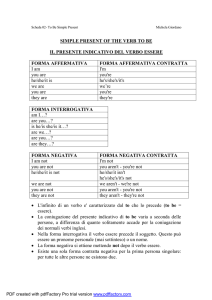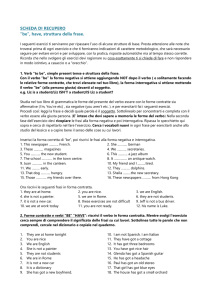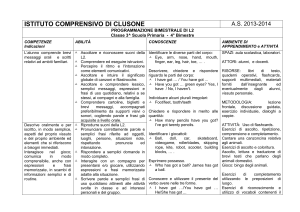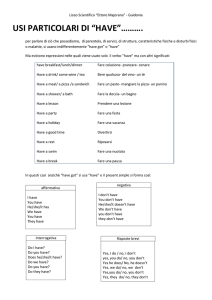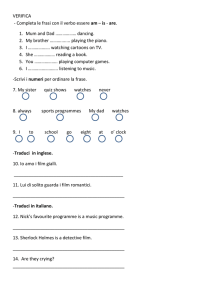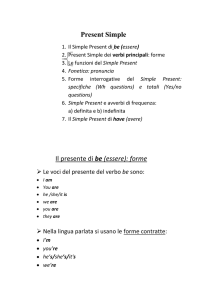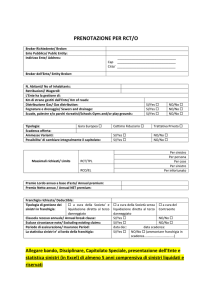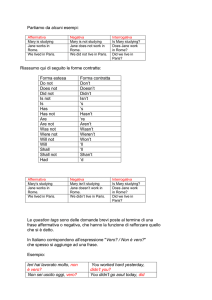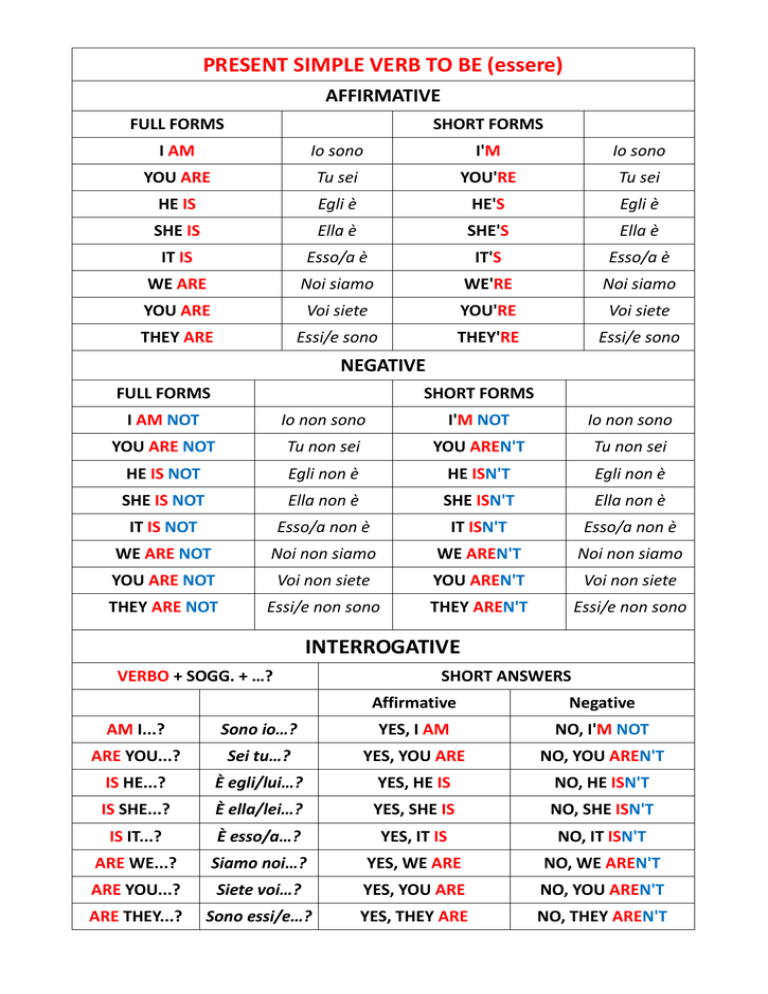
PRESENT SIMPLE VERB TO BE (essere)
AFFIRMATIVE
FULL FORMS
SHORT FORMS
I AM
Io sono
I'M
Io sono
YOU ARE
Tu sei
YOU'RE
Tu sei
HE IS
Egli è
HE'S
Egli è
SHE IS
Ella è
SHE'S
Ella è
IT IS
Esso/a è
IT'S
Esso/a è
WE ARE
Noi siamo
WE'RE
Noi siamo
YOU ARE
Voi siete
YOU'RE
Voi siete
THEY ARE
Essi/e sono
THEY'RE
Essi/e sono
NEGATIVE
FULL FORMS
SHORT FORMS
I AM NOT
Io non sono
I'M NOT
Io non sono
YOU ARE NOT
Tu non sei
YOU AREN'T
Tu non sei
HE IS NOT
Egli non è
HE ISN'T
Egli non è
SHE IS NOT
Ella non è
SHE ISN'T
Ella non è
IT IS NOT
Esso/a non è
IT ISN'T
Esso/a non è
WE ARE NOT
Noi non siamo
WE AREN'T
Noi non siamo
YOU ARE NOT
Voi non siete
YOU AREN'T
Voi non siete
THEY ARE NOT
Essi/e non sono
THEY AREN'T
Essi/e non sono
INTERROGATIVE
VERBO + SOGG. + …?
SHORT ANSWERS
Affirmative
Negative
AM I...?
Sono io…?
YES, I AM
NO, I'M NOT
ARE YOU...?
Sei tu…?
YES, YOU ARE
NO, YOU AREN'T
IS HE...?
È egli/lui…?
YES, HE IS
NO, HE ISN'T
IS SHE...?
È ella/lei…?
YES, SHE IS
NO, SHE ISN'T
IS IT...?
È esso/a…?
YES, IT IS
NO, IT ISN'T
ARE WE...?
Siamo noi…?
YES, WE ARE
NO, WE AREN'T
ARE YOU...?
Siete voi…?
YES, YOU ARE
NO, YOU AREN'T
ARE THEY...?
Sono essi/e…?
YES, THEY ARE
NO, THEY AREN'T
PRESENT SIMPLE VERB TO HAVE (avere)
AFFIRMATIVE
FULL FORMS
SHORT FORMS
I HAVE GOT
Io ho
I'VE GOT
Io ho
YOU HAVE GOT
Tu hai
YOU' VE GOT
Tu hai
HE HAS GOT
Egli/lui ha
HE'S GOT
Egli/lui ha
SHE HAS GOT
Ella/lei ha
SHE' S GOT
Ella/lei ha
IT HAS GOT
Esso/a ha
IT' S GOT
Esso/a ha
WE HAVE GOT
Noi abbiamo
WE' VE GOT
Noi abbiamo
YOU HAVE GOT
Voi avete
YOU' VE GOT
Voi avete
THEY HAVE GOT
Essi/e hanno
THEY' VE GOT
Essi/e hanno
NEGATIVE
FULL FORMS
SHORT FORMS
I HAVE NOT GOT
Io non ho
I HAVEN'T GOT
Io non ho
YOU HAVE NOT GOT
Tu non hai
YOU HAVEN'T GOT
Tu non hai
HE HAS NOT GOT
Egli/lui ha
HE HASN'T GOT
Egli/lui ha
SHE HAS NOT GOT
Ella/lei non ha
SHE HASN'T GOT
Ella/lei non ha
IT HAS NOT GOT
Esso/a non ha
IT HASN'T GOT
Esso/a non ha
WE HAVE NOT GOT
Noi non abbiamo WE HAVEN'T GOT
YOU HAVE NOT GOT
Voi non avete
THEY HAVE NOT GOT
Noi non abbiamo
YOU HAVEN'T GOT
Voi non avete
Essi/e non hanno THEY HAVEN'T GOT Essi/e non hanno
INTERROGATIVE
Verbo + soggetto + …?
SHORT ANSWERS
Affirmative
Negative
HAVE I GOT...?
Ho io…?
YES, I HAVE
NO, I HAVEN'T
HAVE YOU GOT...?
Hai tu…?
YES, YOU HAVE
NO, YOU HAVEN'T
HAS HE GOT...?
Ha egli/lui…?
YES, HE HAS
NO, HE HASN'T
HAS SHE GOT...?
Ha ella/lei…?
YES, SHE HAS
NO, SHE HASN'T
HAS IT GOT...?
Ha esso/a…?
YES, IT HAS
NO, IT HASN'T
HAVE WE GOT...?
Abbiamo noi…?
YES, WE HAVE
NO, WE HAVEN'T
HAVE YOU GOT...?
Avete voi…?
YES, YOU HAVE
NO, YOU HAVEN'T
HAVE THEY GOT...?
Hanno essi/e…?
YES, THEY HAVE
NO, THEY HAVEN'T
EXPRESSIONS WITH HAVE
Ci sono alcune espressioni in cui have non indica possesso, ma viene usato come i
verbi non ausiliari (have breakfast, have lunch, have dinner, have a shower...). Esso
non è accompagnato dal got e usa l'ausiliare do/does e don't/doesn't per la forma
negativa, interrogativa e le risposte brevi
She doesn't have breakfast
Do they have dinner at the restaurant? Yes, they do/No they don't
PRESENT SIMPLE USE
Il present simple si usa per descrivere:
1.
Azioni abituali: She goes to bed at ten o'clock = Va a letto alle 10
2.
Situazioni permanenti: She lives with her family = vive con la sua famiglia
3.
Orari (scolastici, dei treni...): It leaves at 11.00 a.m.
4.
Gusti e sentimenti: He doesn't like basketball
N.B. Non si usa
mai per descrivere ciò che si sta facendo in questo momento
3rd PERSON
La terza persona singolare (he, she, it) del present simple affermativo si forma
secondo le seguenti regole ortografiche:
1. aggiungendo -s alla forma base per la maggior parte dei verbi:
Forma base
3a persona
Start
Starts
Live
Lives
Play
Plays
2. aggiungendo -es se il verbo termina in -o. -ch, -:sh, -s, -x
Forma base
3a persona
Go
Goes
Watch
Watches
Finish
Finshes
Pass
Passes
Mix
Mixes
3. sostituendo la -y con la “i” e aggiungendo -es se il verbo termina con la
y preceduta da una consonante
Study
Studies
Fly
Flies
PRESENT SIMPLE all forms
AFFIRMATIVE: SOGGETTO + FORMA BASE
I WORK
Io lavoro
YOU WORK
Tu lavori
HE WORKS
Egli/lui lavora
SHE WORKS
Ella/lei lavora
IT WORKS
Esso/a lavora (funziona)
WE WORK
Noi lavoriamo
YOU WORK
Voi lavorate
THEY WORK
Essi/e lavorano
NEGATIVE
FULL FORMS:
SOGG. + DO/DOES + NOT + FORMA
BASE
SHORT FORMS:
SOGG. + DON'T/DOESN'T + FORMA
BASE
I DO NOT WORK
Io non lavoro
I DON'T WORK
YOU DO NOT WORK
Tu non lavori
YOU DON'T WORK
HE DOES NOT WORK
Egli/lui non lavora
HE DOESN'T WORK
SHE DOES NOT WORK
Ella/lei non lavora
SHE DOESN'T WORK
IT DOES NOT WORK
Esso/a non lavora
(funziona)
IT DOESN'T WORK
WE DO NOT WORK
Noi non lavoriamo
WE DON'T WORK
YOU DO NOT WORK
Voi non lavorate
YOU DON'T WORK
THEY DO NOT WORK
Essi/e non lavorano
THEY DON'T WORK
INTERROGATIVE
DO/DOES + SOGG. + FORMA BASE
SHORT ANSWERS
Affirmative
Negative
DO I WORK...?
Lavoro io…?
YES, I DO
NO, I DON'T
DO YOU WORK...?
Lavori tu…?
YES, YOU DO
NO, YOU DON'T
DOES HE WORK...?
Lavora egli/lui…?
YES, HE DOES
NO, HE DOESN'T
DOES SHE WORK...?
Lavora ella/lei…?
YES, SHE DOES
NO, SHE DOESN'T
DOES IT WORK..?
Lavora esso/a…?
YES, IT DOES
NO, IT DOESN'T
DO WE WORK...?
Lavoriamo noi…?
YES, WE DO
NO, WE DON'T
DO YOU WORK...?
Lavorate voi…?
YES, YOU DO
NO, YOU DON'T
DO THEY WORK...?
Lavorano essi/e..?
YES, THEY DO
NO, THEY DON'T '
MODAL VERB: CAN (permission/ability)
•
•
•
•
•
Il verbo modale è sempre seguito dalla forma base del verbo principale
è uguale per tutte le persone
alla forma negativa aggiunte solo not, n't (come i verbi ausiliari be e have)
alla forma interrogativa precede il soggetto (come i verbi ausiliari be e have)
non usa mai gli ausiliari do/does, don't/doesn't
AFFIRMATIVE: SOGG. + CAN+ FORMA BASE
I CAN GO
(io posso andare)
I CAN SPEAK... (io so parlare...)
YOU CAN GO
YOU CAN SPEAK...
HE CAN GO
HE CAN SPEAK...
SHE CAN GO
SHE CAN SPEAK...
IT CAN GO
IT CAN SPEAK...
WE CAN GO
WE CAN SPEAK...
YOU CAN GO
YOU CAN SPEAK...
THEY CAN GO
THEY CAN SPEAK...
NEGATIVE
FULL FORMS:
SOGG. + CAN+ NOT + FORMA BASE
SHORT FORMS:
SOGG. + CAN’T+ FORMA BASE
I CANNOT GO
I CAN’T GO
YOU CANNOT GO
YOU CAN’T GO
HE/SHE/IT CANNOT GO
HE/SHE/IT CAN’T GO
WE CANNOT GO
WE CAN’T GO
YOU CANNOT GO
YOU CAN’T GO
THEY CANNOT GO
THEY CAN’T GO
INTERROGATIVE
CAN+ SOGG. + FORMA BASE
SHORT ANSWERS
Affirmative
Negative
CAN I GO...?
YES, I CAN
NO, I CAN’T
CAN YOU GO...?
YES, YOU CAN
NO, YOU CAN’T
CAN HE GO...?
YES, HE CAN
NO, HE CAN’T
CAN SHE GO...?
YES, SHE CAN
NO, SHE CAN’T
CAN IT GO...?
YES, IT CAN
NO, IT CAN’T
CAN WE GO...?
YES, WE CAN
NO, WE CAN’T
CAN YOU GO...?
YES, YOU CAN
NO, YOU CAN’T
CAN THEY GO...?
YES, THEY CAN
NO, THEY CAN’T
IMPERATIVES
L'imperativo è formato da due persone la seconda singolare e la seconda
plurale, che sono uguali. Nell'imperativo le persone non sono mai espresse.
AFFIRMATIVE
L'imperativo affermativo si usa per dare comandi, consigli e istruzioni, esso è
uguale alla FORMA BASE DEL VERBO
BE (essere)
Be quiet!
Stai zitto!
Be quiet!
State zitti!
GO (andare)
Go!
Va'!
Go!
Andate!
NEGATIVE
L'imperativo negativo si usa per esprimere proibizioni, esso si ottiene con
DON'T + FORMA BASE.
Don't be stupid!
Non essere sciocco
Don't be stupid!
Non siate sciocchi
Don't copy!
Non copiare!
Don't copy!
Non copiate!
SHALL WE...?/LET'S...
SHALL + WE+ FORMA BASE +....
Si usa per proporre a qualcuno di fare qualcosa insieme. Questa struttura
corrisponde in italiano alla forma interrogativa noi del presente indicativo.
Shall we do our Maths homework
Facciamo i compiti di matematica?
LET'S + FORMA BASE + ...
Si usa per proporre a qualcuno di fare qualcosa insieme. Questa struttura
corrisponde in italiano alla forma noi dell'imperativo.
Let's listen to music
Ascoltiamo della musica.
PRESENT CONTINUOUS
Si usa per parlare di azioni in corso di svolgimento e si traduce con “stare” + gerundio.
AFFIRMATIVE: PRESENT VERB BE (ESSERE) + FORMA BASE + -ING
FULL FORMS:
SHORT FORMS:
I AM PLAYING
Io sto giocando
I'M PLAYING
YOU ARE PLAYING
Tu stai giocando
YOU'RE PLAYING
HE IS PLAYING
Egli/lui sta giocando
HE'S PLAYING
SHE IS PLAYING
Ella/lei sta giocando
SHE'S PLAYING
IT IS PLAYING
Esso/a sta giocando
IT'S PLAYING
WE ARE PLAYING
Noi stiamo giocando
WE'RE PLAYING
YOU ARE PLAYING
Voi state giocando
YOU'RE PLAYING
THEY ARE PLAYING
Essi/e stanno giocando
THEY'RE PLAYING
NEGATIVE
FULL FORMS:
NEG. SEMPL. VERB BE+FORMA BASE +-ING
SHORT FORMS:
NEG. CONTR. VERB BE+FORMA BASE +-ING
I AM NOT PLAYING
Io sto giocando
I'M NOT PLAYING
YOU ARE NOT PLAYING
Tu stai giocando
YOU AREN'T PLAYING
HE IS NOT PLAYING
Egli/lui sta giocando
HE ISN'T PLAYING
SHE IS NOT PLAYING
Ella/lei sta giocando
SHE ISN'T PLAYING
IT IS NOT PLAYING
Esso/a sta giocando
IT ISN'T PLAYING
WE ARE NOT PLAYING
Noi stiamo giocando
WE AREN'T PLAYING
YOU ARE NOT PLAYING
Voi state giocando
YOU AREN'T PLAYING
THEY ARE NOT PLAYING
Essi/e stanno giocando
THEY AREN'T PLAYING
INTERROGATIVE
INTERROG. VERB BE+FORMA BASE+-ING
SHORT ANSWERS
AFFIRMATIVE
NEGATIVE
AM I PLAYING...?
Sto giocando…?
YES, I AM
NO, I'M NOT
ARE YOU PLAYING...?
Stai giocando…?
YES, YOU ARE
NO, YOU AREN'T
IS HE PLAYING.. ?
Sta lui giocando…?
YES, HE IS
NO, HE ISN'T
IS SHE PLAYING...?
Sta lei giocando…?
YES, SHE IS
NO, SHE ISN'T
IS IT PLAYING ...?
Sta esso/a giocando…?
YES, IT IS
NO, IT ISN'T
ARE WE PLAYING ...?
Stiamo giocando…?
YES, WE ARE
NO, WE AREN'T
ARE YOU PLAYING ...?
State giocando…?
YES, YOU ARE
NO, YOU AREN'T
ARE THEY PLAYING...?
Stanno giocando…?
YES, THEY ARE
NO, THEY AREN'T
1
PRESENT CONTINUOUS -ing form spelling
Forma base
Read
Talk
Play
Study
Phone
Ride
Make
Stop
Swim
Travel
Run
regola
Forma in -ing
Se il verbo termina con una Reading
consonante si aggiunge -ing
Talking
Se il verbo termina con una y si
aggiunge -ing
Se il verbo termina per e si elimina
la e e si aggiunge -ing
Se il verbo termina in una
consonante preceduta da una sola
vocale accentata (per p, l. m, n)
raddoppia la consonante finale e si
aggiunge -ing
Playing
Studying
Phoning
Riding
Making
Stopping
Swimming
Travelling
Running

